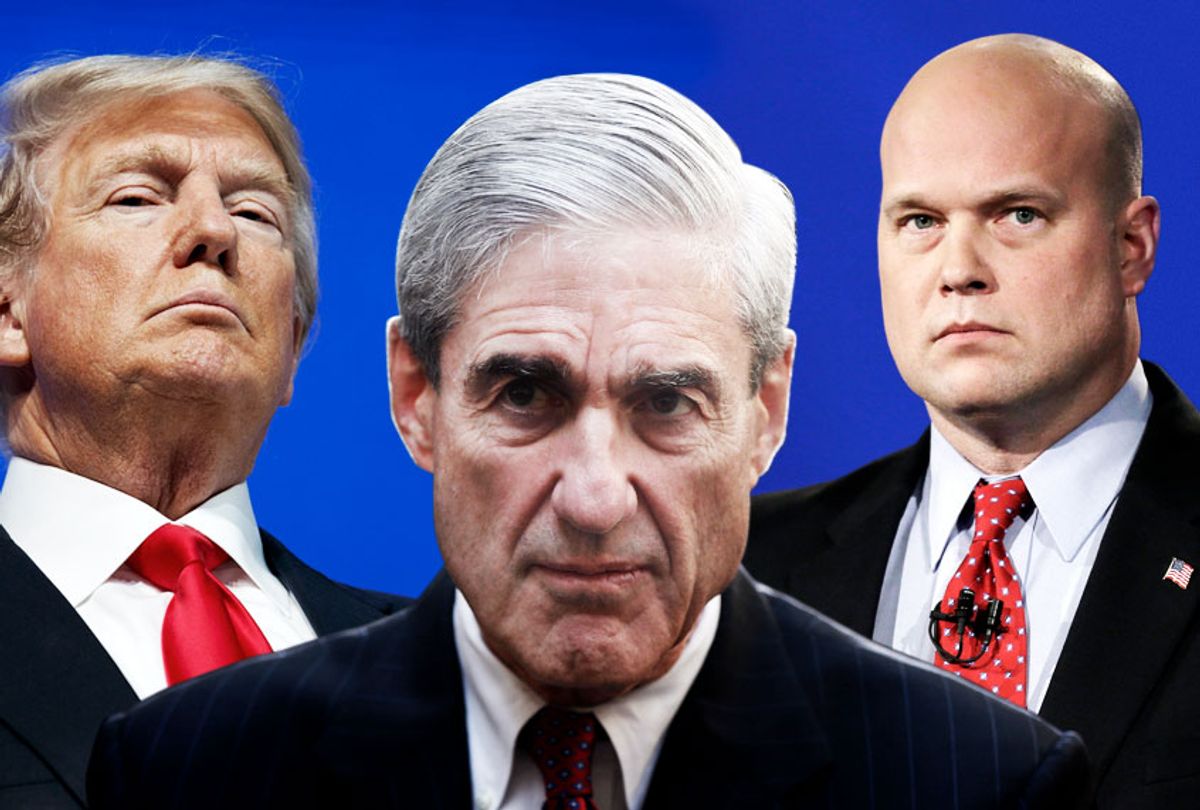President Donald Trump declared on Sunday that he will not rein in his new acting attorney general, Matt Whitaker, if he attempts to curtail special counsel Robert Mueller's probe into the Trump-Russia scandal.
"It's going to be up to him," Trump said during his appearance on "Fox News Sunday," according to Politico. "I would not get involved."
Although the president insisted that he didn't know about Whitaker's staunch opposition to the probe prior to appointing him and that "I don't think it had any effect" on his decision to choose Whitaker as a replacement for then-Attorney General Jeff Sessions, Trump also made it clear that he sympathizes Whitaker's views.
"What do you do when a person’s right? There is no collusion. He happened to be right," Trump told "Fox News Sunday."
Trump's decision to appoint Whitaker has been harshly criticized for a number of reasons. Foremost among them is Whitaker's long history of trying to discredit the Mueller probe, which he is supposed to impartially oversee as head of the Justice Department. In July 2017, Whitaker told CNN that "I could see a scenario where Jeff Sessions is replaced with a recess appointment, and that attorney general doesn’t fire Bob Mueller, but he just reduces his budget to so low that his investigation grinds to almost a halt," according to The Washington Post. That same year he called Mueller's appointment "ridiculous" and "a little fishy." On other occasions he has argued that Mueller should not look into Trump's finances and that top Trump campaign officials weren't wrong for meeting with a Kremlin-connected lawyer for dirt on Hillary Clinton during the 2016 presidential election because "if you have somebody you trust that is saying you need to meet with this individual because they have information about your opponent, you would take that meeting."
It isn't only Democrats who have criticized Trump's appointment of Whitaker. An ad urging Whitaker to recuse himself from the Mueller probe started airing last week (including during one of Trump's favorite shows, "Fox & Friends") thanks to a group called Republicans for the Rule of Law. That group is part of the larger organization Defending Democracy Together that was co-founded by high profile Republicans including commentator Bill Kristol and former New Jersey Governor Christine Todd Whitman.
Judge Andrew Napolitano, a Fox News personality who has a longstanding friendship with Trump, told Salon last week that he supports a lawsuit by the State of Maryland claiming that Whitaker's appointment was illegal in the first place. This has been another common criticism of Trump's appointment of Whitaker since it was first announced.
"There are two statutes governing who can run the Justice Department," Napolitano told Salon. "A general statute that applies to who can run the principal department of a government when there’s a vacancy in the head of that department, like Secretary of State or Attorney General or Secretary of Defense, and then there’s a specific statute that applies just to the DOJ. So the traditional judicial analysis when two statutes clash — one clash, one is general and one is specific — is to apply the specific. In fact, the general one even makes reference to the existence of the specifics since the general one, the Vacancy Act, came after the specific one."
He added, "All of this means, in my view, that any judicial mind examining the circumstances of Mr. Whitaker’s appointment would find that it is not lawful because it does not comply with the specific statute, which requires that whoever runs the DOJ — I’m not talking about any other department, but the DOJ — must have been nominated by the President, confirmed by the Senate at the time they are elevated. The reason for that is because of the extraordinary authority vested in whoever runs the DOJ. You might say, 'Well, the Secretary of Defense has extraordinary authority, he kills people.' Yes, he does, but he can’t fire a shot without the President’s permission. The Attorney General does not need the President’s permission to commence a criminal investigation, to direct the FBI, or to shut down a criminal investigation. For that reason, Congress required the Senate confirmation because Congress wants to know the legal thinking of the human being who’s going to run the DOJ. It’s too much power, Congress wrote — not I — to put in the hands of an untested, unexamined person, which is what Mr. Whitaker is. By untested and unexamined, I mean untested and unexamined by the rigors of the Senate confirmation process."



Shares